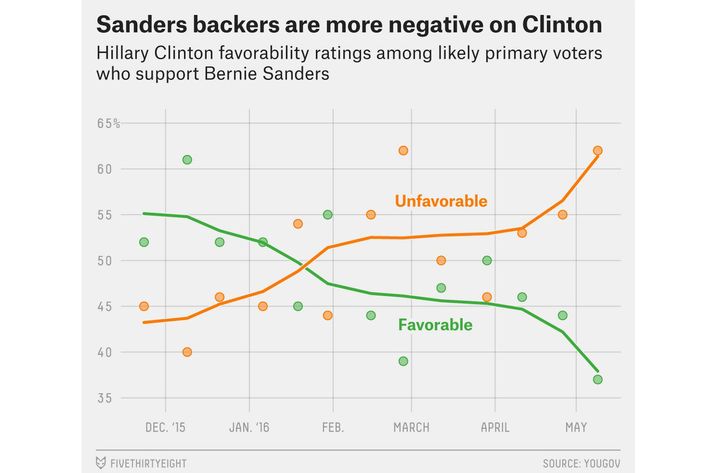
In the 1990 movie Quick Change, Bill Murray, Geena Davis, and Randy Quaid rob a bank in New York with surprising ease, then find the task of simply getting to the airport almost impossible. Near the end, with no time to spare, the trio has managed to board a bus to the airport, only to be detained when a — well, “hippie” is a bit of a cliché, so let’s just say, a man who appears to have had formative experiences in the 1960s — stages a mini-demonstration rather than exit. At the current stage of the Democratic presidential primary contest, Bernie Sanders is this man:
Sanders has his reasons for staying in the race. They may not be entirely terrible reasons. Maybe he wants the chance to continue speaking about his policies through the last primary, or perhaps he wants the leverage to push through changes to the nominating process. But, given the overall stakes of his behavior, his decision is also maddeningly narcissistic. Despite his loud protests, the system, for all its hodgepodge qualities, is definitely not rigged against him. Sanders is losing because significantly fewer people have voted for him. Hillary Clinton has won 56 percent of the vote, and 54 percent of the pledged delegates. Primaries that have excluded independents (the democratic quality of which can be debated) have helped her, but caucuses (which are even less democratic) have helped him.
Instead, his campaign is making increasingly hysterical claims of fraud and misconduct. At a convention in Nevada, Sanders supporters threw a fit when their attempt to overturn the results of a caucus, won fair and square at the polls by Clinton, failed. Numerous neutral journalists have described the Sanders campaign’s complaints as utterly fallacious. Nonetheless, these claims are having an effect. The Sanders drumbeat depicting Hillary Clinton’s now-inevitable win as the product of corrupt machinations by insidious big-money interests is turning his supporters staunchly against her:

Clinton is struggling in head-to-head polls against Donald Trump mainly because her supporters tell pollsters they would pull the lever for him against Trump, while his supporters increasingly refuse to say the same for her. Now, much or even all of this problem can be massaged away by autumn. However, it is at least possible that Sanders is getting carried away in a messianic fervor that he will not walk away from readily. A recent New York Times story described numerous Sanders staffers as “disheartened” by the campaigns “near-obsession with perceived conspiracies on the part of Mrs. Clinton’s allies.”
If there is a reason to believe Sanders might not unify his supporters behind Clinton, as ordinary losing candidates do, it’s that Sanders has never seen his political project in ordinary terms. Sanders places himself substantively on his party’s left wing, of course. But more than that, Sanders has depicted his campaign as a metaphoric “revolution.” A revolutionary campaign, even a bloodless one, does not follow normal political guidelines. Since it regards itself as the legitimate incarnation of the popular will, any mechanism that thwarts its triumph is ipso facto illegitimate. This explains the unusual propensity of Sanders supporters to circulate conspiracy theories suggesting Sanders has been robbed, which are merely more deranged versions of Sanders’s own rhetoric. Sanders’s statement in response to the outburst of his supporters in Nevada is a revealing peek into the revolutionary mindset:
“It is imperative that the Democratic leadership, both nationally and in the states, understand that the political world is changing and that millions of Americans are outraged at establishment politics and establishment economics. The people of this country want a government which represents all of us, not just the 1 percent, super PACs and wealthy campaign contributors.
“The Democratic Party has a choice. It can open its doors and welcome into the party people who are prepared to fight for real economic and social change – people who are willing to take on Wall Street, corporate greed and a fossil fuel industry which is destroying this planet. Or the party can choose to maintain its status quo structure, remain dependent on big-money campaign contributions and be a party with limited participation and limited energy.”
What makes this so telling is that Sanders depicts a procedural quarrel — one in which his campaign has no leg to stand on — as a fight between “the 1 percent” and “the people of this country.” Sanders has a longstanding habit of attributing any disagreement with his policies as the result of corruption, disregarding the possibility that actual conviction might inspire any of it. He accordingly believes that only the corrupt power of big money has prevented his ideas from prevailing. Sanders is now applying the same logic to the primary fight, with Clinton in the role of greedy corporate overlord. Sanders does not merely believe he deserves to win, he believes that a Sanders defeat means the people have been thwarted; ergo, such a result is necessarily rigged.
It’s remarkable that the opponents to Donald Trump, who (accurately) depicted him as a con artist, an authoritarian, and an existential threat to their party’s character have all stepped aside, even in the face of mathematical odds less daunting than those of Sanders, who continues to fight on. It’s possible that both Sanders and the Republican opposition to Trump care less about stopping Trump than anybody expected.






























